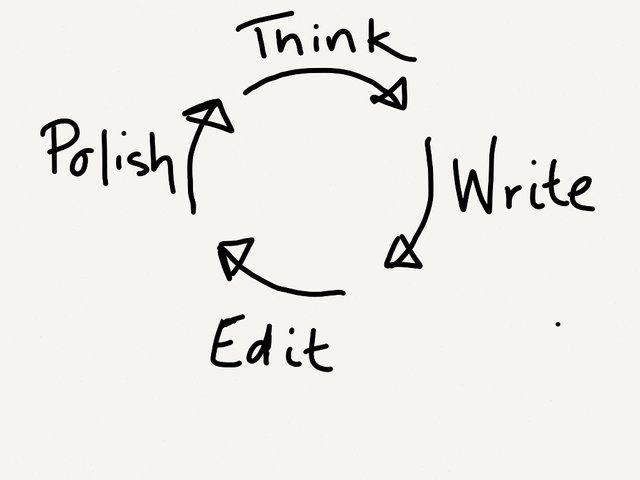Reflecting on Elmore Leonards's Ten Rules of Writing

I’ve been writing as a hobby on and off for the last five years. It’s certainly been a thing to keep me entertained that I can also use in a meaningful fashion considering my other hobbies. As such I’m always open to learning new things about the medium and have gained knowledge in a fair bit of writing topics during that time.
Since I was in the library recently I decided to check out a couple of books on writing, and had to pay a $40 fee to renew my library card because I don’t live in the same district as the library. But I digress. The first was a beginners guide to writing a novel. A long time goal of mine since I began writing, but one that I haven’t had the opportunity to try with things such as college getting in the way.
The other book, and the topic of this blog, looked a bit more curious to me. The title seemed simple enough, a writers own ten rules of writing. It seemed that there would be fairly enough information given its size. But opening it gave a much different picture.
Pictures aside, there is no text on the left side of any page. Whatever is actually written is a paragraph at best that only covers a third of the page. That was enough to get me to take it home with me. Not really necessary since the book could literally be read in less than five minutes, but it’s nice to ponder over his words.
The book, titled “Elmore Leonard’s 10 Rules of Writing”, could be described with one word. Simple. From its title to the word written inside. There isn’t actually that much making it up. In fact, I’m pretty sure I’ve already written more word here than is even in the book. For me, that just makes for a more compelling read than I expected.
So now would be a good time to go over what his rules of writing as a way for me to better understand his points. And for any aspiring writers reading this, maybe this can be a good way to help improving their writing.
1) Never open a book with the weather
“If it’s only to create atmosphere, and not a character’s reaction to the weather, you don’t want to go on too long”
A pretty simple rule. His next sentence explaining make sense. If someone is reading your book for the first time and this is their first impression, then they’ll either skip it or put down the book. Watching a video by Literature Devil also has a similar philosophy in regards to comic books. That first page is important and it should tell us something about the character we’re about to follow for the rest of the story.
Of course, he did state there are some exceptions. His example indicates that it’s more than fine to start off with weather, as long as you do it in an interesting manner. At the very least, maybe using words beyond snow or rain.
2) Avoid Prologues
“They can be annoying, especially a prologue following an introduction that comes after a foreword.”
Let’s be honest, how many of us read the foreword of some book we just found in a store or library. It’s just not what wraps any of us, even the most avid of readers, into a story. He says it himself, prologues in a fictional work is just backstory. It can and should be placed elsewhere, not for someone to prime a story with. He even takes a term from a Steinbeck character, “Hooptedoodle”.
And I think he’s right. Readers don’t want to read a lot of hooptedoodle.
3) Never use a verb other than “said” to carry dialogue
This was the first rule that surprised me a little. Over my time reading forums and stories by other writers, this seems like this rule is the opposite of convention. In fact, in my stories I avoiding using it too often as well. Generally replacing them with “replied”, “responded”, or “answered”.
From his words, this is because any term other than “said” is the writer being intrusive into his story. Making their presence known, which is against his premise of being “Invisible” as he stated at the beginning.
This is one that I really needed to think about. I know most writers want to avoid using said too often because they feel it sounds repetitive readers. But that made me wonder, does it? Is it because readers might not want too much repetition, or is it writers not wanting to sound as if they have a limited vocabulary.
His example brings up that an author used a word instead of “said” that he didn’t know the meaning of. Thus he had to stop reading and pull out a dictionary to find out. It’s certainly not a good idea to write something that makes the reader have to stop and even try to understand what you just wrote. It breaks immersion and harms the enjoyment of the story.
Reading more, I think I better understand this point better. But I think that it’ll be better brought up then rather than now.
4) Never use an adverb to modify the verb “said”…
Same as above, as well as the fact that it is kind of cheating on the last rule. It’s another way of the writer putting themselves in the story and he even calls it a “mortal sin”.
He adds that doing this distracts and interrupts from the flow of the conversation. Here I understood his point as a reader.
Let me ask this question. Has there ever been a time where you had to reread a line of dialogue because the story described it in a way different from how you read it?
Chances are the answer is yes. I know that this is true for me. In fact I find myself rereading dialogue fairly often on fanfiction sites now that I think about it.
5) Keep you exclamation points under control
He says no more than two or three for every 100,000 words. Unless you can do it in an interesting manner.
He doesn’t really elaborate on top of this, but I imagine that this continues of his last two rules about the verb said.
6) Never use the words “suddenly” or “all hello broke loose”
What he said is enough. People that use terms like this also don’t follow the previous rule.
7) Use regional dialect, patois, sparingly
He warns that once you start doing this, it becomes hard to stop doing so. Basically bleeding into the rest of your work.
For me, this is something that I’ve felt for years. I see other writers try to write in an accent for one of their characters. Usually southern. This was something that I always found distracting when reading. As well as the fact that it turns out that writing in improper English for spoken words is hard to read.
8) Avoid detailed descriptions of characters
For his example using the story “Hills Like White Elephants”, he states that we only get one phrase referencing the “American and the girl with him”. That being the girls hat being placed onto a table. Yet as he explains, we see and know them from the tone of their voices.
Basically if your writing out a paragraph to describe what your character looks like. You’re pausing the story to interject what you have to say about your story. Instead, one would be better off letting the story do the explaining instead.
9) Don’t go into great detail describing places and things
Even if you’re good at it. It’s best to avoid because doing so brings the story to a standstill.
10) Try to leave out the part that readers tend to skip
Think about this as a reader. If your reading something, what part is do you pay the most attention to. And what parts would you rather skip? He bets that we don’t skip dialogue.
And he’s right. Because if we really think about it, what we’re looking for in a story, is just that. The story. We’re looking for what pushes the plot along, and dialogue does just that. It pushes the story across. Whether it’s the plot itself or giving us insight to a character from their words or actions. There’s a reason why quotes are what’s remembered from any medium of story-telling.
He sums all this up by saying that writing shouldn’t get in the way of reading. That distractions from trying to sound like a writer harms flow of narrative. I think that this is something that many writers online struggle with. We focus too much on being writers, that we forget about being readers.
So what probably is the best way to close this out. I quote what Elmore Leonard considers to be his most important rule to writing to sum up the ten.
If it sounds like Writing, I rewrite it
And I have a lot of rewriting to do.

Hi bigbear51,
Visit curiesteem.com or join the Curie Discord community to learn more.
Thank you very much. I'm really grateful that you enjoyed this.
Congratulations @bigbear51! You have completed the following achievement on the Steem blockchain and have been rewarded with new badge(s) :
You can view your badges on your Steem Board and compare to others on the Steem Ranking
If you no longer want to receive notifications, reply to this comment with the word
STOPDo not miss the last post from @steemitboard:
Vote for @Steemitboard as a witness to get one more award and increased upvotes!
Hey @bigbear51 , thank you for the tips.
I am not about to write a novel, but some tips can also applied here on Steemit. I think the last point you make:
Might be a bit difficult. You have to view your work from another angle, which is sometimes not that easy. Overall, thank you Sir.
Cheers,
Max
Yeah, learning how to do that consistently would probably take a lot of practice. But I understand that whatever you write should be viewed as if you were a reader.
I liked the point thrid the most, never use any other word except SAID, I totally agree with this rule he proposed.
But I see writers using so many varied words these days :\
A shame, but I'm not surprised. As I stated above, reading many forum posts. Writers seem to be encouraged to try and change up their word so not to sound repetitive. Unfortunately it comes off sometimes as someone just pulled out a thesaurus and replaced words without thinking why these words were different in the first place.
Yeah disappointing that some writers still choose to experiment with words with analyzing the impact on reading pleasure of reader.